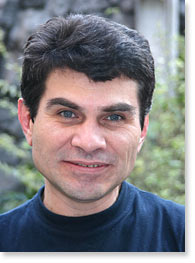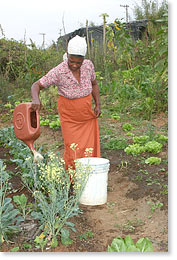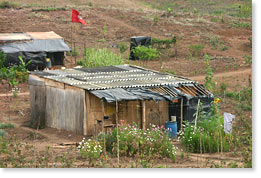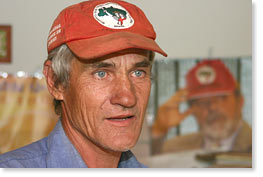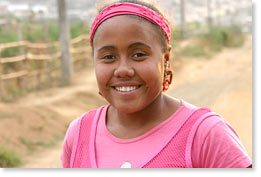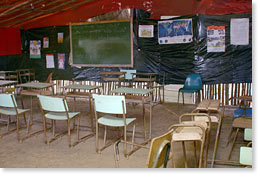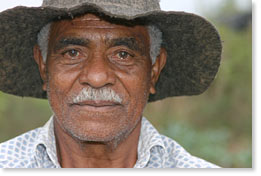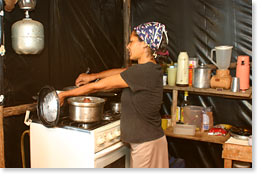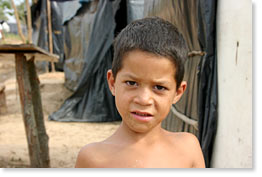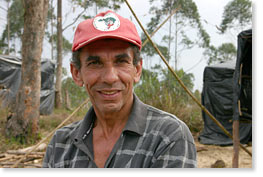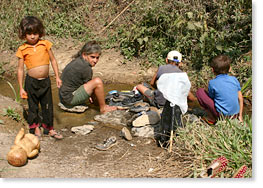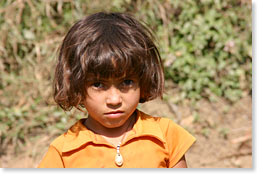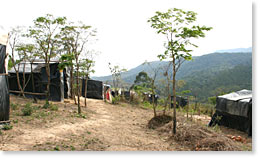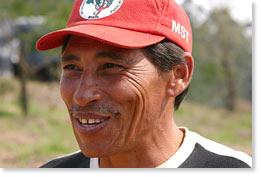|
Interview with Geraldo Fontes of the MST The Landless Rural Workers' Movement Part 2 -- Agrarian Reform / Agribusiness São Paulo, Brazil
We don’t even consider the use of violence In Motion Magazine: A lot of violence has been directed against the MST yet my understanding is -- I don’t know if this is true -- you promote non-violence. Can you talk about that? Geraldo Fontes: The MST, from its origins, but mainly from ’87 and ’88 onwards, the movement has been portrayed by the media as a violent movement that uses violence to reach its aims. Since the beginnings, the origins of the movement, with the strong influence of the church -- and I am not talking about being linked to the church but in terms of certain ideas that influenced the movement -- we have had it very clear that in order to achieve our objectives we have to organize the families and mobilize the families to fight for their rights, to protest. In other words, the right of human beings, in terms of economic rights, cultural rights, environmental rights, these rights have to be achieved with the participation of the people that have the rights. People have to participate. It cannot be done by a group that represents these families and their interests in the struggle. That is why the movement is organized with the participation of the families -- the groups of ten families, fifty families, five hundred families, with their representations. So what you have then is the actual families will fight, struggle for their rights, not a group will do it for them. That is why we don’t even consider the use of violence to achieve our goals. The fact is the violence comes from large landowners against us. It can be from an organization, a company, or an individual. That is what the media calls “conflict in the countryside” or “confrontation in the countryside”. Three weeks ago, in an attempt of land occupation in Paraná, that we managed to occupy, a group of gunmen shot against the families killing one of our comrades and hurting six other people. The media portrayed it as a confrontation in the countryside. It is very different when you are talking about confrontation if you are talking about two forces with equal power but that is not what happened. Here what we had was families walking without guns towards the gunmen and these people with heavy weapons shooting towards the families. You have on one side one person killed and six people hurt and on the other side no one was hurt. The way it is worked in the media is totally absurd. A manipulation of the way the public is supposed to view these situations. That is an aspect. But another aspect that they manipulate is they call violence what has nothing to do with physical violence or weapons -- what they call a violation against private property. That is called violence. Private property is now in society a sacred issue. If you do anything against private property it is portrayed as violence and not as a constitutional right that civil society is entitled to. So, there are two aspects of the use of the term violence and because of those two elements the media portrays the movement as violent. But the movement is a movement of non-violent struggle, of legitimate struggle for people’s rights. In Motion Magazine: Can you go into this constitutional aspect? Geraldo Fontes: Promulgated in 1988, Articles 184 to Article 191 (of the Brazilian constitution) deal with agrarian reform and agricultural policy. Article 184 says it is the responsibility of the union to expropriate for social purposes, or agrarian reform, rural property which is not fulfilling its social function. Article 186 specifies which are the requisites, the conditions for this social function of property. It lists the rational and appropriate use of land; the appropriate use of natural resources available; the maintenance of the environment; the respect of labor laws; and the use of the soil to favor the well being of the landowners and the workers in the region. Also, the social function of a property is only achieved when those four requirements are met simultaneously. So, what is the first element of the social function of the land in Brazil? The land has to be used rationally. For example, suppose my property is 1,000 hectares. For me to breed cattle, for each cow I need one hectare. If on 1,000 hectares I have only ten cows and I don’t have anything else, I am not using my property in a rational way because I have 990 hectares not being used. That is a very basic example. They have to follow social responsibilities. They have to follow labor law. They have to pay salary and observe different worker’s rights. If they violate this they are not fulfilling social responsibilities. It should be mentioned that in Brazil there are lots of examples of slave labor on several farms and it has even been identified that agribusiness is using slave labor on several farms. Also, the property cannot affect the environment. Let’s suppose on my property of 1,000 hectares, I plant soy. I’m using the whole area so it is productive. It is a rational use. I pay salaries. I meet all the requirements of the law. But, if in order to plant soy I needed to hire a plane that will spray fertilizer in the field and that pesticide in the air spreads to other areas and affects people in the area, I will be breaking this condition. Also, if I have a thousand hectares, 20% of my property will have to be of native forest. That’s called legal reservation. Again, all these elements have to be met simultaneously, not just one or the other. The Civil Code and private property In Motion Magazine: Do these issues, the land occupations, end up getting resolved in the court? Geraldo Fontes: Here, in Brazil, we have the judicial power divided into three levels. The first one is at the local level. Then the regional level -- sometimes the regional level is the same as the state level. And the third level, which is the federal level. The federal level involves the Supreme Court, which creates legal precedent. The judiciary, at the two first levels, is heavily influenced by the economic and political power of the region or community. The consequence of that is that the interpretation of the law at the local and regional levels is conditioned to the interests of the locality. For instance, the occupation of land. As I said, the constitution, which is the supreme law of the country, says in Article 184 that the land that is not fulfilling its social function has to be expropriated for the agrarian reform. But, at the same time, the Civil Code says that private property rights have to be assured in any action. When the MST organizes a land occupation, the local courts interpret the law in terms of the Civil Code, in terms of protecting private property rights and not using the constitution. The judge issues a document of “title reintegration”, which means that the people that are occupying the land will have to leave. And when they send the paper to the community they send the police to deliver that and it tends to be violent. When the judge asks for title reintegration, the MST appeals and it goes to the next level, to the regional level. But because the regional level is also compromised with the political interests of the region we have to appeal and go up to the federal courts. Grassroots pressure and the Constitution The difference is that when you reach the federal courts, the judges at the federal courts they have to interpret the laws according to the constitution. They can’t just apply civil codes and also they are not compromised with local interests, so, usually the decision is more favorable. To answer your question, you can overcome a conflict situation by appealing to the courts but it is a very long process, which can be three, four years because of the local bureaucracy at all levels. The MST with all its organizations and grassroots pressures the federal government to pressure the judiciary system to apply the constitution in those decisions regarding land occupation. Also, there is an organism of the government called INCRA, which is the National Institute of Colonization and Agrarian Reform, which is responsible for making agrarian reform feasible according to the constitution. INCRA has a legal department, which does the negotiation at all these levels in order to meet the demands of the constitution. Our strategy is to pressure INCRA in order to speed these decisions Lula -- President Luis Ignacio da Silva In Motion Magazine: What is the situation with Lula (President Luis Ignacio da Silva)? What is his attitude on agrarian reform? Geraldo Fontes: Good question. A little bit of history. For Brazilian society, not just the MST, Lula represents a whole historical route for the country that started between ’78 and ’84. It is important to remember that Lula, between ’78 and ’84, participated actively in trade union struggles and became a trade union leader. Also, he was one of the founders of the Workers Party -- PT. And at the time of its founding, the PT had a series of proposals for social change that they intended to implement in society. Since ’78, Lula has become a symbol, an icon for all the social struggles of the country. When Lula launched his candidacy for the presidency the first time, the society as a whole and the social movements decided to bet on the possibility of social change through him in power. During this campaign the word hope was used quite strongly. In terms of social grassroots, of people in settlements and camps, Lula means opportunity, a possibility of an effective agrarian reform. With the government of Lula, the families in camps felt they will finally get land. The families in settlements felt that they would finally get policies implemented for them, for their production, defending their rights and interests. The grassroots of the movement was very enthusiastic about his candidacy and very supportive of him becoming president. In ’94, Lula lost the second time in his candidacy for presidency. He lost to a candidate called Fernando Henrique Cardoso, FHC. And from that point onwards, there was a change in the policies of PT, in the way PT behaved. If before PT had straight links to social movements and trade unions, from that point onwards PT developed very strong institutional links, which means they focused their concerns on the administration of city houses, in localities, instead of focusing on organizing and mobilizing society. But the image that Lula has built, the significance he has in society, is still present, is still very strong in society. (Editor: Lula won the presidency in October 2002.) Social support and social pressure Since his campaign though, we had it very clear what the situation would be, which means with Lula’s presidency we would have on one side all those interests and groups that have controlled this country historically, which we call the dominant class. This dominant class involves the economic model and the foreign relations characteristic of the dominant class. It was clear that this dominant class would do everything they could to maintain the situation, to keep hold, to have control of the situation. And on the other side we would have the people, the excluded in society. The Lula government meant that we would have a dispute between these two classes -- the class of the excluded, the workers, on one side, and the dominant class on the other side. We had it very clear that we would have to pressure Lula’s government in order to get the social changes that we needed. At the same time, we were aware that we would have to give social support to Lula’s government. Why? Because once we pressured Lula’s government to implement new policies for social change, he would be pressured by the dominant class not to make those changes. The reaction of the dominant class would be to pressure and create a series of measures to drive Lula back to their original interests. To force Lula to maintain the policies that would support their interests. 10 million support referendum against FTAA To give a concrete example, in order to implement the agrarian reform, Lula’s government will have to take several measures in terms of the FTAA. FTAA has a section which deals with the agricultural issue which basically prioritizes the model which we are against -- the large landholding and monoculture, etc. If Lula wanted to meet our demands, he would have to say no to FTAA. The dominant class, with all the interests of the transnationals, would pressure Lula to join the FTAA and not meet the demands from the social movements. When the dominant class started pressuring and blackmailing Lula’s government, we would have to give our support to Lula’s government to show that what Lula was going to do, in terms of FTAA, would be supported by society. One possible measure would be to have a referendum to decide if Brazilians wanted or not FTAA. We organized this referendum and a bit more than 10 million Brazilians participated. 96 percent said that they were against the FTAA negotiations. It was a referendum organized by civil society. There were several committees, with the participation of the church, the trade union movement, some political parties. Having the result of that referendum, we went back to Lula and said, “Look, we do not want FTAA and if the dominant class are pressuring you to support FTAA you can show to anyone that Brazilian society does not want it with the results of the referendum”. That is a form of social support that we must give Lula. This is a paradoxical situation because we have to pressure but at the same time we have to support. We have to do both with the right timing. National Plan for Agrarian Reform Another form of social support would be what we did last year in terms of the agrarian reform. We participated along with some representatives of the government, representatives from other social movements from the countryside, and representatives from institutes, universities, and research centers. We all participated in the project called National Plan for Agrarian Reform. The government did not have a plan on how to implement agrarian reform. Our way of dealing with that was to say, “Look, we have drafted this plan with all the different needs of the people so we will present it to Lula and we want it to be implemented with all the different aspects.”
Lula transferred this plan to the Ministry of Agrarian Development, which is one of the many different ministries within the federal government but one of the poorest ministries. It doesn’t have economic or political power in the government. The agrarian reform plan is too ambitious for the scale of this ministry. As an example, within the many different goals of this agrarian reform plan there was one goal which was to be able to assure settlement for one million families, up to 2006. What did that mean? First, we would have to get the INCRA to expropriate the land that was not fulfilling their social function. We would also need the judiciary system to speed the legal process. Also, we would need the financial ministry to release money for credit to support the families living in settlements. It was a much broader thing than just the agrarian reform in one department. The Ministry of Agrarian Development would not have the power to mobilize all these different sectors of the state. We were very frustrated to realize that Lula’s government did not have this broader understanding of what was involved in agrarian reform We continue pressuring Lula’s government to implement agrarian reform and change the policies that will eventually affect the dominant class. And we haven’t stopped the different uses of struggle -- occupations and other things. Even if the media does not make it clear, our enemy is not Lula’s government. Our enemy is the agricultural model and the current economic model. We are against latifundio, large landholding, monoculture, agribusiness, mechanization, the use of chemical products, and the focus on agriculture for export. When we occupy latifundio, large landholding, it is not because we are against Lula’s government. We are occupying to help Lula’s government to apply what the constitution says in order to change this model, which they are using now. This is the situation we are at with Lula’s government at the moment. According to the way things move we will have to increase pressure or social support and it will all depend on the power correlation. Genetically Modified Organisms In Motion Magazine: What about Lula’s position on GMOs? What is your opinion on GMOs? Geraldo Fontes: Talking about this power correlation, this power balance, in the specific case of GMOs, Lula’s government has met the interests of agribusiness, the dominant class. We resisted it very strongly. We said, “This is not what we want”. The issue here is that Lula made a decision to allow the crop for 2004 so they can plant genetically-modified soya and harvest it in 2005 because the social movements were not strong enough. We were not strong enough to oppose that in terms of protest and mobilization, in terms of street protests, etc. This is a very complex situation. This model of large landholding, monoculture, etc. is presented to society as, “It is working out. This is the right recipe.” For example, every month they have what they call the trade surplus, the difference between the exports and imports. If you export more you get more dollars and so have a surplus. If you import more then you have a deficit. Since last year, the exports have exceeded by far the imports. What is leading these exports is the production linked to agribusiness. It’s basically the production of commodities -- soybeans, cotton, soft cotton, which are exported and when they get to their destination are processed and turned into jeans, etc. The exports have a very low international price because they are commodities. The imports have a higher price because they have added value. Since last year, the imports have been reduced and they increased the amount of goods they were exporting. The only area that increased exports was agribusiness. So, when the government announces there has been a positive balance in the commercial trade, that positive result is presented as being due to agribusiness. This reinforces the idea that all agriculture policy has to be moved towards agribusiness. “It is working. You can see.” Agribusiness or food for Brazilian society The counter side of it is that we are not producing food for the local population. The Hunger Zero program, which was implemented at the beginning of Lula’s government, became a demagogic proposal -- just words. It has become a program of just giving basic monthly food allowances to people. If we changed the basic agricultural model and instead of benefiting agribusiness the National Plan of Agrarian Reform was implemented, we would be able to produce food for Brazilian society. We would be able to offer jobs to people that cannot even get food. And we would protect the environment, which is something Brazil is losing. There is a lot of manipulation which says agribusiness is the right thing because it is bringing money in and agrarian reform is backwards because it will not generate a lot of money. Now, all that has to do with food sovereignty. Why? Because this agricultural model we have now is not conducive to food sovereignty. This model pressures the government to take a series of measures, for instance to allow the planting of GMOs this year. And now they are considering extending it for another year. That’s why they have to change the agricultural model and the economic model. That economic model privileges only getting money in order to pay internal and foreign debt. It forces the government to submit to foreign policies from the IMF and other international organizations and directly affects Brazilian society, which does not have enough food and basic supplies. We very strongly believe that the change in the implementation of agrarian reform implies the implementation of a new economic model. Chile’s Pinochet and privatization In Motion Magazine: Could you describe the role of the U.S. in Brazil? For example, during the military coup in ’64 and also in the implementation of neoliberal policies? Geraldo Fontes: When we talk about neoliberalism, neoliberalism is not an abstract thing. Neoliberalism means concrete actions determined by transnationals, multilateral organizations, financial international organizations. They have measures that are concrete, for example, privatization. Privatization affects the lives of communities, be it in Central America, South America. Deliberately those policies have been proposed following the interests of American corporations, for instance. Those agreements and treaties that have been implemented are a product of this deliberate policy that started in the ’70s. They started being implemented through the various military dictatorships in Latin America. In Motion Magazine: Which military dictatorships? Geraldo Fontes: The first military dictatorship that implemented the new policy, even before Margaret Thatcher in England, and the Reagan policies in America, was Chile -- Pinochet. They privatized everything. All worker’s rights that had been achieved in the ’60s, that Salvador Allende wanted to make effective, were slashed. In fact, the Chilean government now does not have any sort of political, economic power to be able to change anything. In Motion Magazine: What do you mean? Geraldo Fontes: Everything was privatized. The laws were changed. For example, the possibility you had before for the government to propose reforms, like agrarian reform, is not available any more. The government cannot do that. You have to consider that the parliament is completely right wing and would not be interested in developing agrarian reform. The government does not have economic or political conditions to make any changes. The ’64 military coup paved the way If we analyze even here in Brazil, from the military coup in ’64 all the way up to ’71, they paved the conditions for later on the neoliberalism to be effectively implemented. For instance, they finished all the trade union structures. From killing leadership to destroying physical places where people used to meet to discuss. And also changing laws, policies that since the ’40s and ’50s had been proved and used. They re-wrote those laws. The military dictatorship favored, paved, constructed the route for even later on when there wasn’t any dictatorship any more. The way had been paved for establishing much more radical neoliberal policies. By removing rights, spaces, special organizations -- they were not there any more -- it was much easier to push forward. Even in Mexico, which was not considered a military dictatorship. It was a dictatorship of a party, which from the second half of the ’70s started the implementing of a series of policies that would pave the way for in ’84 what is going to look like neoliberal policy. It was a little different here in Brazil because in the second half of the ’70s there was the re-birth of social movements, of trade union organizations, of political parties -- as I mentioned earlier. And that provoked a delay that pushed neoliberalism to be implemented only in the ’90s when the government of (President Fernando Affonso Collor) de Mello implemented the initial policies of neoliberal government. In a way, in Argentina, we had the same thing. Crises in Chile and Mexico, Argentina and Brazil If you analyze what happened in Mexico in ’84 and in Chile in the ’70s, you had a slow process that was implemented step by step. In Brazil and Argentina it was in ten years, in the ’90s. In a very short period of time, ten years, they implemented policies that were implemented in 25 years in Chile and Mexico. That’s why the neoliberal crises in Argentina and Brazil were much stronger than in Mexico and Chile. That doesn’t mean that in Chile and Mexico they don’t have a crisis, it just means that in Argentina and Brazil it was much stronger. But let’s stop theorizing about neoliberalism. Completely identified with the policies of the U.S. In Latin America the implementation of neoliberalism is completely identified with the policies of the U.S. because almost all of the policies that have been implemented were to favor American corporations. Even the measures that are related, they also will benefit American corporations. For instance, Los Planos, the various plans like Plan Colombia, Plan Panama, they also mean intrusion in local interests. In the case of those plans they not only relate to economic measures but they also relate to other interests that will be benefited by the presence of those policies. Here, I am going to talk about the aspect of cultural identity. For instance, Plan Puebla Panama. Some actions, such as road building, they are destroying communities in the south of Mexico. Destroying their cultural identity. Talking about Mesoamerica -- Central America and Mexico -- the populations that live in those areas they are called “children of corn”. Why are they called children of corn? From traditional communities there are lots of stories of the origin of the world being built through corn. Corn represents the world. The formation of the world comes from corn. One of the elements that creates their identity is the maintenance of the corn in its different varieties. When you create a Plan, for instance, Plan Puebla Panama, which has a lot of different structures built -- roads, dams -- those particular constructions will affect in a broader way the life of those people, those communities that live there. Roads would be built not in order to facilitate people’s lives but in order to have easy access for the transport of production. And this production has to have the right quantity and the standards specified by the corporations that are interested in the production. For instance, the production of corn. The corn has to meet the standards from Campbell Soup. This demand from Campbell affects the cultural identity of the population that used to produce corn according to their needs in their traditional way. And this actually has caused most of the corn production in that region now to be GMO. So, the U.S. policies don’t just involve economic issues but also other issues such as this cultural issue which has increased the number of suicides and deaths in the region. When you lose your cultural identity you have no reason to live. For the Latin American peoples this is being clearly identified with the U.S. government. It is not just limited to CIA operations to overthrow governments. It’s much broader. For example, FTAA is not just a matter of free trade in Latin America. As I just said, it involves the issue of destroying the identity of many communities and peoples. We don’t want FTAA. We want a different way of integrating the different peoples in Latin America. We are against the FTAA being implemented through military bases and plans like Plan Colombia. The economic, the ideological, the military In Motion Magazine: Military bases? Geraldo Fontes: There are many American military bases in Latin America. That is what I want to get at. There is the economic aspect, which is the free trade agreements. There is the ideological aspect, which is the imposition of new cultures and the destruction of the local cultures. And in order to give support to these two others, there is the aspect of the militarization of Latin America. In Barbados there is a North American base. In Ecuador there is the military base in Manta. Colombia is going through a very heavy process of militarization. The whole Amazonia region is being monitored. In the southern part of Amazonia there was a proposal for a space base to be turned into a military base. There is a policy from the U.S. to impose in Latin America their interests, which manifests through the interests of the large corporations. And it is not an interest of the American people. It is a direct interest from the U.S. companies and corporations through the policies of the U.S. These economic, ideological, and military aspects together, in Latin America, create this pressure that is being put on the continent, provoking a very strong blowback in the U.S., which makes the people in the U.S. ask themselves, “Why do people hate us so much?” Sustainable development and democracy In Motion Magazine: Which leads back to: what is the relationship between fighting for sustainable development and democracy? Is there one? Geraldo Fontes: Of course there is. But it depends on what type of democracy you are talking about. What we understand by democracy is the effective participation of society in the decision-making process. That is why we insist on building power from the grassroots communities to transform society. It is in the grassroots that you materialize the participation. That’s where people are living participation and democracy. That is why we promote sustainable development, because it is going to be the actual community using mechanisms that belong to the community and the state to meet the demands of the community. And obviously those demands are to benefit the development of the actual community. The community will not take a series of measures and policies that will negatively affect the community. When we talk about democracy and sustainable development, yes, there is a link but understanding democracy in this sense, of the community making decisions based on the community’s needs. Sustainable development does not just involve the productive element but also involves society, social relations, interpersonal relations, human relations. If you do not understand development in this broad sense it castrates the whole process. It limits it heavily. Back to: Part 1 -- Building the New Society Now Published in In Motion Magazine March 26, 2005 Also see:
|
||||||||||||||||||||||||||||||||||||||||||||||||||||||||||||||||||
If you have any thoughts on this or would like to contribute to an ongoing discussion in the  What is New? || Affirmative Action || Art Changes || Autonomy: Chiapas - California || Community Images || Education Rights || E-mail, Opinions and Discussion || En español || Essays from Ireland || Global Eyes || Healthcare || Human Rights/Civil Rights || Piri Thomas || Photo of the Week || QA: Interviews || Region || Rural America || Search || Donate || To be notified of new articles || Survey || In Motion Magazine's Store || In Motion Magazine Staff || In Unity Book of Photos || Links Around The World NPC Productions Copyright © 1995-2018 NPC Productions as a compilation. All Rights Reserved. |


